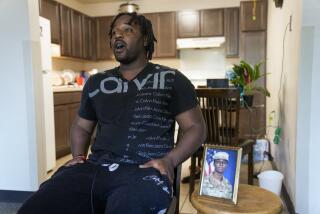Deserters still looking north for their lodestar
- Share via
TORONTO — He was on his way to his hometown of Buffalo, N.Y., he told his military higher-ups, to see if the Bills’ unproven quarterback, J.P. Losman, was “the real deal.”
But on that long bus ride from Clarksville, Tenn., last year, the soldier vomited twice, maybe three times -- and it wasn’t football that had him so unnerved.
As he rolled north, Army Sgt. Patrick Hart was veering off a road he’d been on for nearly 10 years.
Every mile he traveled led away from the Army.
Away from his wife, Jill, who worked in the commander’s office at his Ft. Campbell, Ky., base, and away from their young son.
Away from the country he had sworn to defend.
“I knew I was at a turning point,” the 33-year-old Hart said of the wrenching ride toward the border, where he would leave his country behind.
From Buffalo, Hart would cross into Canada. His parents, who were in on his secret, drove him across the Peace Bridge and delivered him to a network of Canadian supporters who welcome disillusioned U.S. soldiers with open arms, a place to stay and legal advice.
Hart became one of at least 25 U.S. troops who have applied for refugee status.
In a recent interview at a Toronto restaurant, more than a year since he wore the uniform and made the trip, Hart wore a Bills jersey as he discussed the complexities of his decision but voiced no regrets.
“I have no desire to go back,” he said.
Listed as AWOL
Back at Ft. Campbell, an unsuspecting Jill Hart picked up the phone at the house she had decorated in red, white and blue, where a Rosie the Riveter poster hung on the wall. Her husband of five years said he was not coming home.
Within days, Patrick Hart was listed as AWOL from the Army.
Jill, who had thrown herself into the military life -- counseling families, working for the company commander -- was told the Army would stop health benefits for her epileptic son, then 3.
The threat was supposed to convince Patrick Hart to reconsider. It convinced Jill Hart her husband was onto something.
“I thought we had this great relationship,” she recalled of her life within the military. “It made it very clear I’d been living in this world seeing what I wanted to see.”
She acknowledges she would have told the base commander if she knew of her husband’s plans, out of fear of the trouble he would be in.
Though devastated, she flew to Toronto, where the family was reunited in September 2005, a month after her husband crossed the border. Jill Hart decided to give it a year. “Three days later I was fine,” she says now.
With their families and the resisters’ organization helping with living expenses, the Harts have been active with peace groups and the Toronto Epilepsy Assn., and visible critics of the war that Patrick calls a “war of aggression.” He and others say that they still consider themselves soldiers, that the military left them, not the other way around.
“If you want to support the troops, bring them home,” said Hart, who was in the Army 9 1/2 years and served nearly a year in Kuwait in 2003. He left a month before he was to be sent to Iraq.
To prepare for Iraq, he says, he made himself study pictures and videos of atrocities captured by other soldiers: “People getting ripped apart by machine guns. Little kids with chemical burns all over.... I would watch the beheading of Nick Berg. I was trying to turn myself into a monster so that, when I went over there, there would be no mercy....
“But that leaves scars on the inside,” he said.
Army representatives did not return repeated calls seeking comment.
Supporters estimate there are more than 200 U.S. military deserters in Canada who have not yet sought formal protection.
“There’s a huge amount of support,” Jill Hart said. “We’ve changed minds.”
But not all minds.
In October, two of the self-described war resisters in Canada returned to the United States and turned themselves in.
Kyle Snyder, 23, of Colorado Springs, Colo., was ordered to return to his unit. He has since disappeared.
Darrell Anderson, 24, of Lexington, Ky., was held for three days and received an other-than-honorable discharge.
When Anderson explained his decision at a Kentucky news conference, a World War II veteran in the audience, Les Powers, called him “a deserter ... a coward.”
“They should have shot you,” Powers said.
Uncertain future
In June, Hart and a handful of other military deserters put on black T-shirts emblazoned with AWOL and gathered with “peace mom” Cindy Sheehan in a Fort Erie, Ontario, park. They were cheered by about 100 people, including Bruce Beyer, who moved to Canada after refusing induction into the Army during the Vietnam War.
Beyer said he felt forgotten after fleeing charges in the United States and is determined to show the current generation they have support.
“The limbo in which American war resisters are living in Canada is rather overwhelming, in that the Canadian government has not taken a position of welcome,” said Beyer, whose own experience was far different. Beyer quickly received landed immigrant status when he arrived in Canada in 1972. He spent five years in Canada, returning only after President Carter issued an amnesty for those who left.
The Canadian government, which has troops in Afghanistan but not Iraq, has so far denied refugee status to today’s U.S. troops. The Immigration and Refugee Board in October ruled against Pfc. Joshua Key, saying he would likely be court-martialed if returned to the United States but not subjected to cruel or unusual punishment. Appeals of two earlier rejections, in the cases of Jeremy Hinzman and Brandon Hughey, are pending.
“What that means is that for the war resisters leaving the United States and going to Canada, they’re allowed to live in Canada, they’re allowed to work in Canada, they are even given access to medical and health insurance programs, but they are not given any legal status,” Beyer said. “So they’re really living, I suppose, with the threat of any day being deported.”
He cautions resisters, from experience, that their decision will follow them through life.
“Here I am 58 years old and for something I did 35 years ago, you’re interviewing me,” said Beyer, who returned to the United States in 1977. He owns a woodworking business in Buffalo.
Despite an uncertain future, the Harts -- who still display the poster of Rosie the Riveter in their Toronto apartment -- have a positive view of the past year, which they would have spent apart if Patrick Hart had gone to Iraq as ordered.
“Every day I wake up with my son,” Patrick Hart said, “it just assures me I did the right thing.”
More to Read
Sign up for Essential California
The most important California stories and recommendations in your inbox every morning.
You may occasionally receive promotional content from the Los Angeles Times.










